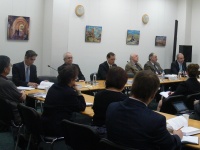Registration
You will receive an email confirming your registration.
IMGXYZ3120IMGZYXNuclear disarmament faded from media attention after the New START agreement was signed, but it remains a challenge for the world. The Carnegie Moscow Center presented a new book, Nuclear Reset: Arms Reduction and Nonproliferation (in Russian), published by the Carnegie Moscow Center and ROSSPEN and edited by Carnegie’s Alexei Arbatov and Vladimir Dvorkin of the Institute of World Economy and International Relations. Some of the book’s authors—including Roland Timerbayev of the PIR Center, Sergei Oznobishchev of the Institute of World Economy and International Relations, Alexander Kalyadin of the Institute of World Economy and International Relations, Georgy Toloraya of the “Unity for Russia” Foundation, and Yevgeny Myasnikov of the Center for Arms Control, Energy and Environmental Studies at the Moscow Institute of Physics and Technology—discussed their conclusions. Arbatov moderated the discussion.
The authors focused primarily on the main changes in nuclear arms control and nonproliferation since the New START agreement was signed.
New START and Its Consequences
- Previous treaties: In Arbatov’s view, the new treaty resembles the 2002 Treaty of Moscow, with additions and changes to the verification and accounting rules. For the first time in forty years of Russian-American arms control and nonproliferation negotiations, the provisions affect U.S. weapons to a greater extent than Russia’s arms.
- Potential problems ahead: Arbatov noted that, in response to the growing gap between Russia’s real strategic nuclear forces and the ceilings set by the new treaty—which are higher than Russia’s actual number of strategic nuclear weapons—Russia is discussing plans to deploy a new heavy silo-based intercontinental ballistic missile. If these plans proceed, they would provoke a negative reaction in the United States and create problems for the next round of U.S.-Russia strategic arms reduction treaty talks. Arbatov emphasized that there is currently no clear vision of what a future treaty would look like or when it might be signed, if at all.
Nuclear Energy and the IAEA
The breakdowns and problems at Japan’s Fukushima Daiichi nuclear power plant following the devastating earthquake and tsunami have cast a shadow over the “renaissance” of nuclear energy. Timerbayev said this could change the International Atomic Energy Agency (IAEA)’s activities, which has to respond to nuclear security challenges, and also impact nuclear technology control regimes, including export controls.
Missile Technology Control Regime (MTCR)
- Determining violations: The success of this regime depends on the general arms regime context. Today, the United States seeks to influence countries such as Iran, which it believes is violating the MTCR by cooperating with North Korea. Russia is more ambiguous on this issue.
- A common understanding: Oznobishchev noted that no common understanding or agreement exists of what constitutes a modern threat. Achieving results in the MTCR requires reciprocal interest from all parties concerned. Oznobishchev stressed that even non-binding multilateral agreements would improve the chances of making the MTCR more effective.
Enforcing NPT Compliance
- Missing mechanisms: The Non-Proliferation Treaty (NPT) has no internal mechanisms for enforcing compliance with its provisions. Instead, the IAEA generally performs this task.
- Strengthening the regime: The Iranian and North Korean nuclear programs have brought the nonproliferation compliance issue to the foreground. In Kalyadin’s view, resolving this issue requires strengthening the UN Security Council’s restraining role and reviving the work of its Military Staff Committee. Kalyadin noted that the NPT Review Conference in 2010 helped consolidate the nonproliferation regime by approving a common action program.
North Korea
- Staying in power: Toloraya said it would be a mistake to place bets on the North Korean regime’s imminent collapse. The regime has remained in place despite various predictions of its fall and external pressure in recent years.
- Nuclear development: Furthermore, North Korea continues to develop nuclear technology and claim nuclear power status. It is unlikely to renounce these claims voluntarily in the foreseeable future. Negotiations with Pyongyang should therefore concentrate on stopping new projects from going ahead, Toloraya said. The situation with Japan’s Fukushima Daiichi nuclear power plant could provide an additional argument in this respect.
- Toward resolution: Overall, according to Toloraya, the North Korean nuclear issue needs to be resolved by giving North Korea comprehensive security guarantees.
High-Precision Conventional Weapons
According to Myasnikov, interest in strategic non-nuclear weapons (high-precision conventional weapons) grew when the 2010 U.S. Nuclear Posture Review stressed development of missile defense systems and high-precision weapons. While there is conflicting information about whether the United States will continue funding development of high-precision weapons programs, Myasnikov predicted U.S. development will continue.
